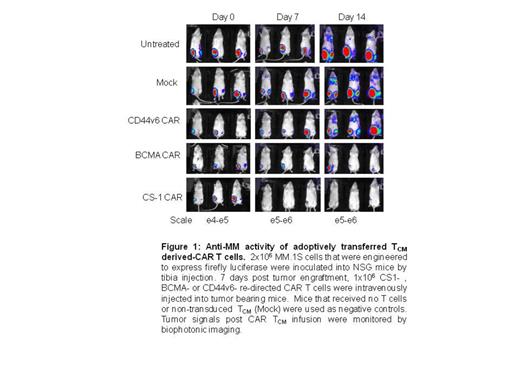Abstract
Multiple myeloma (MM), a plasma cell malignancy, accounts for approximately 1 percent of all cancers and slightly more than 10 percent of hematologic malignancies in the United States. Approximately 20,000 new cases will be diagnosed this year and over 11,000 people will die from this disease. Current therapies for MM often induce remission, but nearly all patients eventually relapse and die. T-cell mediated anti-tumor therapies using genetically modify T cells with specific chimeric antigen receptors (CARs) have non-overlapping activity, toxicity and tumor resistance profiles compared to conventional chemotherapeutic agents.
The main challenge in designing a CAR T cell immunotherapeutic approach is identifying the best antigen for tumor targeting. CS-1 is a cell surface glycoprotein of the signaling lymphocyte activation molecule (SLAM) receptor family that is highly and selectively expressed on normal plasma cells and MM cells, with lower expression on NK cells and little or no expression on normal tissues. This unique expression pattern and proven clinical benefit of CS-1 monoclonal antibody for the treatment of relapsed MM makes CS-1 a good target for CAR T cell therapy.
Central memory T cells (TCM) from PBMC were isolated using a two-step process on the AutoMACS device to first deplete CD14+, CD45RA+ and CD25+ cells, then to positively select CD62L+ cells. These TCM undergo anti-CD3/CD28 bead stimulation and transduction with a lentiviral vector encoding CS-1 CAR containing a CD28 co-stimulatory domain and two mutations on IgG4 linker CH-2 portion to ensure enhanced potency and persistence after adoptive transfer. Gene modified CS-1 CAR T cells specifically lysed MM.1S, a MM cell line, in 4-hour 51Cr release assays and all the CAR+ cells expressed 107a upon co-cultured with the MM.1S cells. To investigate the potency of the CS-1CAR T cells, 2x106 MM.1S cells that were engineered to express GFP firefly luciferase were inoculated into NSG mice by tibia injection. 7 days post tumor engraftment, 1x106 CS-1 CAR T cells were intravenously injected into the tumor bearing mice. In contrast to untreated and mock cell treated mice in which tumor progressed rapidly systemically, single intravenous infusion of CS-1 CAR T cells induced dramatic tumor regression and significantly prolonged survival.
In addition to CS-1, CD44v6 and BCMA are antigens that have also been shown to be over-expressed on MM tumor cells. We therefore compared the two CARs with CS-1 CAR for their anti-MM activity. Based on our studies, targeting CS-1 resulted in the best efficacy (Figure 1) and would be an attractive strategy for development of a clinical trial.
No relevant conflicts of interest to declare.
Author notes
Asterisk with author names denotes non-ASH members.


This feature is available to Subscribers Only
Sign In or Create an Account Close Modal